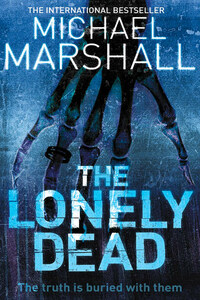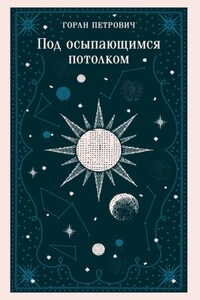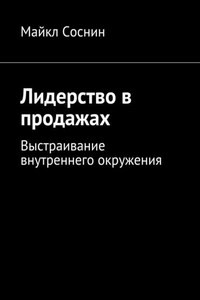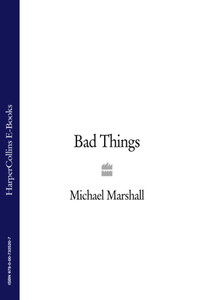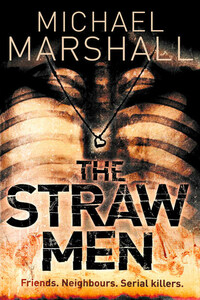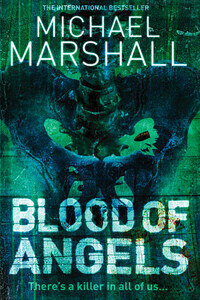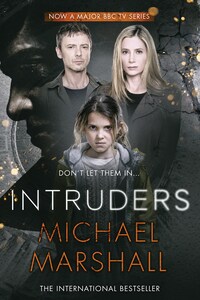Harper An imprint of HarperCollinsPublishers 1 London Bridge Street London SE1 9GF
www.harpercollins.co.uk
First published in Great Britain by HarperCollinsPublishers 2004
Copyright © Michael Marshall 2004
Michael Marshall asserts the moral right to be identified as the author of this work
This novel is entirely a work of fiction. The names, characters and incidents portrayed in it are the work of the authorâs imagination. Any resemblance to actual persons, living or dead, events or localities is entirely coincidental.
All rights reserved under International and Pan-American Copyright Conventions. By payment of the required fees, you have been granted the nonexclusive, nontransferable right to access and read the text of this e-book on-screen. No part of this text may be reproduced, transmitted, downloaded, decompiled, reverse-engineered, or stored in or introduced into any information storage and retrieval system, in any form or by any means, whether electronic or mechanical, now known or hereafter invented, without the express written permission of HarperCollins e-books.
HarperCollinsPublishers has made every reasonable effort to ensure that any picture content and written content in this ebook has been included or removed in accordance with the contractual and technological constraints in operation at the time of publication.
Source ISBN: 9780007163953
Ebook Edition © MARCH 2015 ISBN: 9780007325276 Version: 2015-09-09
We met in the parking lot of the Yakima mall. Yakima is a small city in central Washington State. Itâs a city in the sense that it calls itself one; it has a mall in that you can go indoors and shop without views of the outside reminding you where you are. In three hours only two people had entered the mall. Both were teenagers wearing football shirts. Neither looked as if they had the hard cash to turn the placeâs fortunes around. They came out later, carrying nothing. Huge canvas signs around the third storey advertised retail space at knock-down rates. The big corner spot at street level was vacant, which is never a good sign.
I sat in the car drinking Americanos I fetched from a Seattleâs Best across the way. The coffee shop was the only business on the Avenue that appeared to believe in itself: the rest looked like theyâd stashed their For Lease sign in a safe place, looking to save a few bucks come the inevitable. I could almost hear the sound of a mayor sitting behind a big shiny desk, drumming his fingers, quietly losing his mind as he felt the town snooze around him. It would survive â even this dead zone needed somewhere to host a Les Schwab and make up the national Burger King quota â but it was unlikely to make anyone rich again. If that was what you had in mind, youâd go up to Seattle, or down to Portland. What you did in Yakima I had no idea.
When John Zandt arrived he was driving a big red GMC, dirty and none too new. The passenger side looked like a bunch of cows had rammed it and nearly won. He pulled around the lot until he was level with my pristine Ford Generic. We wound our windows down. The air was cold.
âHey, Ward. You ask them for that at the desk?â he said. âShouldâve got them to spray âNot From Around Hereâ across the hood.â
âYouâre unbelievably late,â I said. âSo fuck you. My place wasnât running a shit-kickerâs special. Evidently you got lucky.â
âStole it from the airport lot,â he admitted. âSo letâs go.â
I got out of my car, leaving the keys in the ignition. I figured Hertz could absorb the loss. They had before. Neither they nor anyone else could trace me from the ID I had used in Spokane. When I climbed in the pickup I saw two handguns lying on the floor. I picked one up, looked it over, put it in a pocket.
âHow far is it?â
âAbout an hour,â Zandt said. âAnd then we have to walk.â
He pulled out of the lot and down the Avenue, past the grey new mall which had helped put the curse on the one Iâd been watching without looking any too prosperous itself. Took a right to follow 82 down through the sprawl that became Union Gap, then buildings by a road, and then just a road. At Toppenish he took 97âs abrupt swerve to the south west. There were no more towns now until an eight-point burg called Goldendale, fifty miles away. Below that, it was another twenty miles to one of the Columbia Riverâs least attractive stretches, upstream of The Dalles dam. Iâd spent time with a talkative barman the night before as I sat drinking in Rooneyâs Lounge, the excuse for a bar offered by Yakimaâs biggest hotel. I knew we were now in the Yakama Reservation and that there was nothing for eighty miles either side of the truck, the indigenous population having clumped together in a couple of small, battered settlements in the north. I knew that the place called Union Gap had once been called Yakima instead, until the rail company forced the Indians to move their capital a few miles north, reluctance worn down by the offer of free land, bribes dividing the tribe in a way hunger or cold winters never had. I knew also that just upriver from The Dalles was a spot where once had thundered the Celilo Falls, a raging, sacred shelf of water where men had harvested salmon for ten thousand years. It was now silent, buried beneath the bloated waters of the dam. Money had changed hands, some time before, but the Yakama were still waiting for their loss to be recognized in more meaningful ways. It seemed likely theyâd be waiting a while longer, possibly until the end of time.
